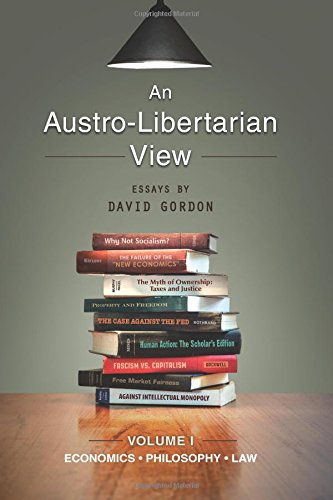I never share online any of the material I publish in the Tom Woods Elite Letter, the monthly 16-page print newsletter I mail to Supporting Listeners. That is exclusive to them and indeed my gift to them.
(And yes, you’re right: in digital 2024 there is indeed something badass about publishing a print newsletter that people receive in the mail, so of course click here to receive it yourself.)
But I’m making an exception this once.
In the last issue I interviewed my eldest daughter, Regina, because this is Father’s Day month and it’s also a milestone month for her, as you’ll see below, so I was feeling sentimental and decided I’d ask if she’d consent to an interview. Here it is:
 An Introduction to Eco...
Best Price: $2.00
Buy New $1.99
(as of 07:55 UTC - Details)
An Introduction to Eco...
Best Price: $2.00
Buy New $1.99
(as of 07:55 UTC - Details)
Tom: You are by far the most voracious reader we have. More so even than I am. And I wonder, what do you attribute that to?
Regina: Well, it started I think with you, because you and Mom had been so intent on nurturing that ability. Also, the books you had me read when I was little really got me thinking, because they were more stimulating than, say, Dick and Jane. You were having me read Animal Farm when I was eight, and then it was The Hitchhiker’s Guide to the Galaxy when I was nine, and it was these concepts that maybe I was too young to fully appreciate, but they got me thinking about topics that no one really talks to kids about.
No one talks about injustices. It’s always utopias that children are taught about. Always a happy place with a good ending. But I’m being told about, say, government systems where there are no good endings. And maybe that’s sort of intense as a child, but I want to know more about that. I want to know more about the world. So I think it just started there. I think I just thought about the world differently because I was exposed to such things early on.
Tom: Hitchhiker’s Guide, of course, is a great series.
Regina: And then The Mysterious Benedict Society.
Tom: The Mysterious Benedict Society! That’s right! What was interesting, too, was that although you read a lot of fiction, which is what most kids would want to read, you also read more than your share of non-fiction. You read that whole series on the history of Western civilization by that woman whose name I can’t remember.
Regina: Susan Wise Bauer, yeah.
Tom: Right.
Regina: To this day, I think I retained more history out of that woman’s work than from anything else I’ve read, even after being a history student for a time. Maybe I was just naturally curious, but I think it helped to be your kid, too, because you were always talking to me, this little wide-eyed kid, about about economics and politics and whatever else.
Tom: If something was going on in the news and you wanted to get my opinion of it, I would give it to you. And, I mean, obviously I would like you to agree with me, but I don’t think I ever gave you the impression that if you had a different opinion from me, you were out of the house.
Regina: It’s funny you say that because I remember when I was little, I once asked you: how do you know if your opinion is the right one? How do you know? Why are we Catholic instead of Muslim? Why are we libertarian? And so I think that kind of prompted me more to critically examine things. And you always encouraged me. You didn’t just tell me to take things at face value or to just go with: well, Austrian economics is the right principle. Critical thinking: I guess that’s really what you pushed me to do. So I’ve always questioned everything.
Tom: That’s a great posture to have.
We lived in Auburn from 2006 to 2010 while I worked at the Mises Institute. You were still too young to be reading that level of material. We did come back several summers after that and spend time at the Institute. And then there was that year when we brought you as a teenager to the Mises University program.
When you were little, though, I still remember you running around the Mises Institute, spending time in the garden. I myself don’t remember all that much from when I was, say, seven years old, which would have been your age when we moved away from the Mises Institute. But do you have any memories associated from that time or from when we came back during those summers?
Regina: Oh, absolutely. I have very fond memories of the Mises Institute. Like [former archivist] Miss Barbara, or Lew Rockwell. They were all very nice to me. I liked the library because I felt very cool when I was in there. You know, I felt sophisticated. It was huge!
I don’t know, there was just something kind of neat about being able to wander the halls of my dad’s workplace. And everyone was nice to me, and they’d answer questions if I had them.
Tom: And I remember when when you came back and actually were in the Mises University program one year. You were much younger than everybody else. And you actually got a passing grade on the written exam.
Regina: Which I attribute to you talking my ear off about those things since I was a kid.
Tom: That probably didn’t hurt.
Regina: Well, I think it was less intimidating because I had you there and you were breaking things down for me [in notes during the lectures], because there were a lot of things that were going over my head – especially I remember [Mises Institute senior fellow] David Gordon, for the life of me –
Tom: And we love him. Do you do you remember that joke about the talking muffins?
Regina: I tell that joke occasionally.
Tom: It was an early example of an anti-joke, before I knew what an anti-joke was. How do you tell the joke to people?
Regina: And I think that’s why I love David Gordon. He was not afraid to throw me off guard.
Tom: Didn’t you and I talk about that trolley problem at one point, and we called him?
Regina: Because I was trying to argue the stance of maybe it’s immoral to to pull the lever in the first place.
 An Austro-Libertarian ...
Best Price: $15.87
Buy New $19.95
(as of 12:10 UTC - Details)
An Austro-Libertarian ...
Best Price: $15.87
Buy New $19.95
(as of 12:10 UTC - Details)
Tom: Right. And then he was trying to explain to us – he was giving the example of a fighter plane in a war, right? Knowing that the plane is going down no matter what. This takes away the issue of whether or not you pull the lever because the plane cannot stop itself from hitting the ground. So the question is, since gravity is absolutely going to bring this plane down, shouldn’t I try to steer it to kill fewer people?
Regina: Though I don’t think that’s necessarily comparable because it’s not like, oh no, gravity’s going to force my hand. No, you can make that active choice. You can step in and be the agent who decides who dies. So I get and appreciate where he’s coming from, but I don’t think it’s quite the same.
Tom: What I loved was that he knew all the different philosophers who had slightly different variations of the trolley problem.
Regina: He just knew the variations offhand. And he didn’t even question why we were asking him this, or why we would bother him with it at all. He was more than happy to answer.
Tom: Oh, he wanted to jump right in. I don’t remember what the subject was, but I remember the first time I needed to ask him something, you know, like a difficult kind of question. And I recall asking Lew Rockwell, do you think David Gordon would mind if I called him? And he said: David loves answering questions.
Regina: He lives for it.





